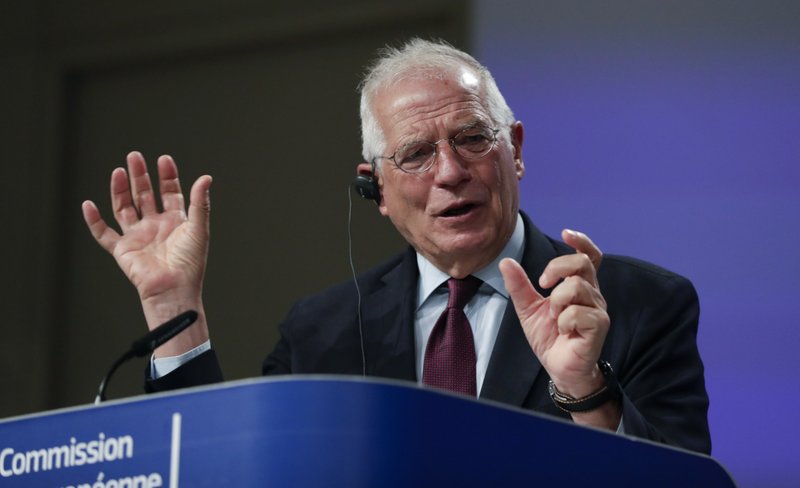BRUSSELS -- The European Union on Tuesday joined members of the Group of Seven major economic powers to insist that Russia must not be allowed back into the fold, after President Donald Trump said that he plans to invite the country to a G-7 summit in the fall.
Trump said Saturday that he is postponing next month's G-7 summit, and plans to invite Russia, Australia, South Korea and India when it does take place. Trump told reporters that he feels the current makeup of the group is "very outdated" and doesn't properly represent "what's going on in the world."
The G-7 members are Canada, France, Germany, Italy, Japan, the United Kingdom and the United States, while the 27-nation EU, the world's biggest trading bloc, also takes part. Russia was suspended in 2014 from what was then the G-8 after its invasion of Ukraine and annexation of Crimea.
The Kremlin has "more questions than answers" about Trump's proposal, spokesman Dmitry Peskov said.
"This is a format that Russia doesn't participate in," Peskov told reporters on a conference call Tuesday. "If Russia is invited, then how will things be with the other participants?"
EU foreign-policy chief Josep Borrell said that Russia should not be allowed back in until it "changes course and the environment allows for the G8 again to have a meaningful discussion, and this is not currently the case."
Borrell said that it's up to Trump, as G7 chairman, "to issue guest invitations, and guest invitations reflect the host priorities. But changing membership, or changing the format on a permanent basis, is not the prerogative of the G7 chair."
Borrell said G-7 members "sit together because they share values, interests and commitments," and he insisted that given the coronavirus pandemic "cooperation among like-minded partners is crucial even more in such difficult times."
On Monday, Canadian Prime Minister Justin Trudeau said that Russia's "continued disrespect and flaunting of international rules and norms is why it remains outside of the G-7 and why it will continue to remain out."
British Prime Minister Boris Johnson's spokesman, James Slack, said the U.K. would "look at the detail of what the U.S. is proposing," and also noted that it's customary for the host to invite other leaders as guests.
Asked whether Russia should be let back in, he said "we're yet to see evidence of changed behavior that would justify its readmittance."
German Chancellor Angela Merkel has said that she will not personally attend a meeting in the U.S. if Trump goes ahead with it unless the course of the pandemic changes by then.
Trump also discussed Brazil's participation in the G-7 meeting during a call Monday with President Jair Bolsonaro, the Brazilian leader said in a Twitter post.
China, which wasn't included among the potential attendees, also criticized Trump's proposal.
"China has always maintained that international institutions or summits should be conducive to enhancing mutual trust, safeguarding multilateralism, and promoting world peace," Foreign Ministry spokesman Zhao Lijian said at a daily media briefing Tuesday in Beijing. "We believe this is also the wish of most countries. It is unpopular to engage in small circles against China, and it is not in the interest of the relevant countries."
Peskov said diplomats would work out the details of possible Russian participation. "There are a lot of unclear elements about this proposal," he said.
Trump has postponed efforts to hold the summit in June at Camp David, saying it could be held in September or after the presidential election in November. "So it might be a G-10, G-11, and it could be after the election is over," Trump said.
Information for this article was contributed by Lorne Cook and Jill Lawless of The Associated Press; and by Stepan Kravchenko and Ilya Arkhipov of Bloomberg News.
A Section on 06/03/2020
